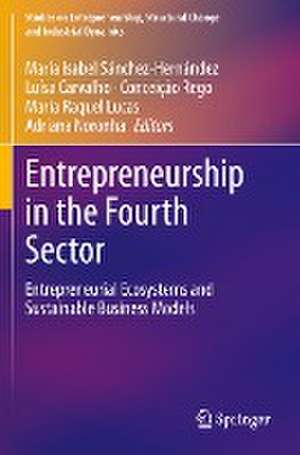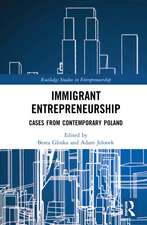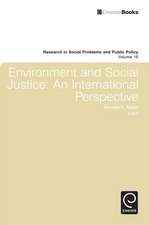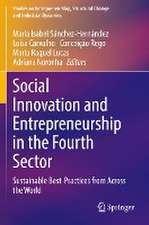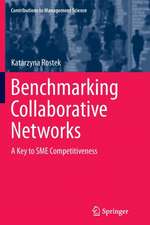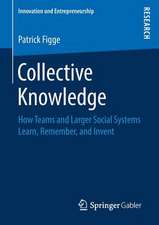Entrepreneurship in the Fourth Sector: Entrepreneurial Ecosystems and Sustainable Business Models: Studies on Entrepreneurship, Structural Change and Industrial Dynamics
Editat de María Isabel Sánchez-Hernández, Luísa Carvalho, Conceição Rego, Maria Raquel Lucas, Adriana Noronhaen Limba Engleză Paperback – 11 iun 2022
| Toate formatele și edițiile | Preț | Express |
|---|---|---|
| Paperback (1) | 1111.04 lei 6-8 săpt. | |
| Springer International Publishing – 11 iun 2022 | 1111.04 lei 6-8 săpt. | |
| Hardback (1) | 1117.19 lei 6-8 săpt. | |
| Springer International Publishing – 10 iun 2021 | 1117.19 lei 6-8 săpt. |
Din seria Studies on Entrepreneurship, Structural Change and Industrial Dynamics
-
 Preț: 449.15 lei
Preț: 449.15 lei - 18%
 Preț: 724.80 lei
Preț: 724.80 lei - 18%
 Preț: 728.43 lei
Preț: 728.43 lei - 18%
 Preț: 1120.81 lei
Preț: 1120.81 lei - 18%
 Preț: 894.34 lei
Preț: 894.34 lei - 15%
 Preț: 649.87 lei
Preț: 649.87 lei - 18%
 Preț: 1118.13 lei
Preț: 1118.13 lei - 18%
 Preț: 792.03 lei
Preț: 792.03 lei - 18%
 Preț: 947.85 lei
Preț: 947.85 lei - 24%
 Preț: 789.90 lei
Preț: 789.90 lei -
 Preț: 380.07 lei
Preț: 380.07 lei - 15%
 Preț: 638.24 lei
Preț: 638.24 lei - 18%
 Preț: 993.78 lei
Preț: 993.78 lei - 15%
 Preț: 641.85 lei
Preț: 641.85 lei - 18%
 Preț: 889.75 lei
Preț: 889.75 lei - 18%
 Preț: 1109.92 lei
Preț: 1109.92 lei - 18%
 Preț: 942.31 lei
Preț: 942.31 lei - 15%
 Preț: 635.47 lei
Preț: 635.47 lei - 15%
 Preț: 635.15 lei
Preț: 635.15 lei - 24%
 Preț: 843.78 lei
Preț: 843.78 lei - 15%
 Preț: 591.14 lei
Preț: 591.14 lei - 18%
 Preț: 951.91 lei
Preț: 951.91 lei - 15%
 Preț: 533.72 lei
Preț: 533.72 lei
Preț: 1111.04 lei
Preț vechi: 1354.92 lei
-18% Nou
Puncte Express: 1667
Preț estimativ în valută:
212.66€ • 231.08$ • 178.75£
212.66€ • 231.08$ • 178.75£
Carte tipărită la comandă
Livrare economică 21 aprilie-05 mai
Preluare comenzi: 021 569.72.76
Specificații
ISBN-13: 9783030683924
ISBN-10: 3030683923
Ilustrații: VI, 356 p. 37 illus.
Dimensiuni: 155 x 235 mm
Greutate: 0.51 kg
Ediția:1st ed. 2021
Editura: Springer International Publishing
Colecția Springer
Seria Studies on Entrepreneurship, Structural Change and Industrial Dynamics
Locul publicării:Cham, Switzerland
ISBN-10: 3030683923
Ilustrații: VI, 356 p. 37 illus.
Dimensiuni: 155 x 235 mm
Greutate: 0.51 kg
Ediția:1st ed. 2021
Editura: Springer International Publishing
Colecția Springer
Seria Studies on Entrepreneurship, Structural Change and Industrial Dynamics
Locul publicării:Cham, Switzerland
Cuprins
Introduction.- Part I: Approaching the Fourth Sector.- The Fourth Sector: The Future of Business, for a Better Future.- Cultivating the Fourth Sector: Active Citizenship and Governance in the Urban Change Process.- Municipal Policies in Spain to Promote Sustainable Development Goals (SDGs): An Approach to the Fourth Sector.- Disability as a Driving Force of Sustainable Business Models in the Fourth Sector.- Reflections on Hybrid Corporations, Social Entrepreneur, and New Generations.- Part II: Social Innovation: Hybrid Models in the Fourth Sector.- Social Innovation in Theory and Practice: European Policies, Strategies and Experiences.- Social Innovation for Sustainability and the Common Good in Ecosystems ofthe Fourth Sector: The Case of Distribution Through Alternative Food Networks in Valencia (Spain).- Energy Cooperatives: Socially Innovative Cooperative Enterprises in the Spanish Renewable Energy Industry.- The Case of “La Hormiga Verde”: Recycling Electronic Waste (e-Waste) as a Paradigmatic Example of a New Entrepreneurial Trend in the Fourth Sector.- Managing Creative Industries Through Cooperation: An Evidence of New Business Models in the Fourth Sector.- Part III: Insights and New Trends.- New Trends in Marketing Aimed at the Fourth Sector in the Fashion Industry.- Effects of the Orange Economy on Social Entrepreneurship in the City of Medellin.- Understanding Sustainable Entrepreneurship in the Fourth Sector Through Integrated Balances: The Case of Uruguay.- May “For-Benefits” Businesses Help Sustainabilityin Future Healthcare Services?.- Beyond Business: Understanding the Foundations and Practices of Corporate Activism.
Notă biografică
M. Isabel Sánchez-Hernández is a lecturer and researcher at the University of Extremadura (Spain). She is also an economist at the University Autonomous of Madrid (Spain), specialized in regional economics and corporate social responsibility. Her research interests range across several key areas within social entrepreneurship and social innovation, including public and social policies.
Luísa Carvalho is professor of management in the Department of Economics and Management at the Institute Polytechnic of Setúbal (Portugal). She is also a researcher at Center for Advanced Studies in Management and Economics (CEFAGE), University of Èvora (Portugal). Dr. Carvalho has several publications in national and international journals, books, and book chapters.
Conceição Rego is professor of economics in the Department of Economics and researcher at the Center for Advanced Studies in Management and Economics (CEFAGE), University of Évora (Portugal). She has coordinated and participated in several projects in the areas of regional development, population economics, and education economics. Her publications span across internationally renowned books and journals.
Maria Raquel Lucas is professor of management in the Department of Management and researcher at the Center for Advanced Studies in Management and Economics (CEFAGE), University of Évora (Portugal). She has authored several publications in national and international journals, books, and book chapters. Professor Lucas is also the coordinator of master courses at the National University of East Timor and is active in several national and international projects involving transnational studies with Latin America, Asia, and Africa.
Adriana Backx Noronha is professor and researcher in the School of Economics, Business and Accounting at the University of São Paulo (Brazil). Her main areas of research are in quantitative methods for decision-making in management, active methods of teaching and learning, and entrepreneurial training. She is the author of several publications, including national and international magazines, books, and book chapters.
Luísa Carvalho is professor of management in the Department of Economics and Management at the Institute Polytechnic of Setúbal (Portugal). She is also a researcher at Center for Advanced Studies in Management and Economics (CEFAGE), University of Èvora (Portugal). Dr. Carvalho has several publications in national and international journals, books, and book chapters.
Conceição Rego is professor of economics in the Department of Economics and researcher at the Center for Advanced Studies in Management and Economics (CEFAGE), University of Évora (Portugal). She has coordinated and participated in several projects in the areas of regional development, population economics, and education economics. Her publications span across internationally renowned books and journals.
Maria Raquel Lucas is professor of management in the Department of Management and researcher at the Center for Advanced Studies in Management and Economics (CEFAGE), University of Évora (Portugal). She has authored several publications in national and international journals, books, and book chapters. Professor Lucas is also the coordinator of master courses at the National University of East Timor and is active in several national and international projects involving transnational studies with Latin America, Asia, and Africa.
Adriana Backx Noronha is professor and researcher in the School of Economics, Business and Accounting at the University of São Paulo (Brazil). Her main areas of research are in quantitative methods for decision-making in management, active methods of teaching and learning, and entrepreneurial training. She is the author of several publications, including national and international magazines, books, and book chapters.
Textul de pe ultima copertă
“The fourth sector” is a relatively new sector that consists of for-benefit organizations that combine market-based approaches of the private sector with the social and environmental aims of the public and non-profit sectors. This book examines trends of entrepreneurship in the fourth sector, describes specific ecosystems fostering new ventures around the world, and characterizes the most common and innovative business models. It covers as well the main effects, among others, of technological change, innovation, and institutional behavior on the sector in the last years.
Caracteristici
Traces an evolutionary approach to understand the complex relationship between private, public, and non-profit sectors Provides meaningful theory and substantial empirical applications on the structural and socio-economic determinants of entrepreneurship in the fourth sector Brings together leading international cases on entrepreneurship in the fourth sector
